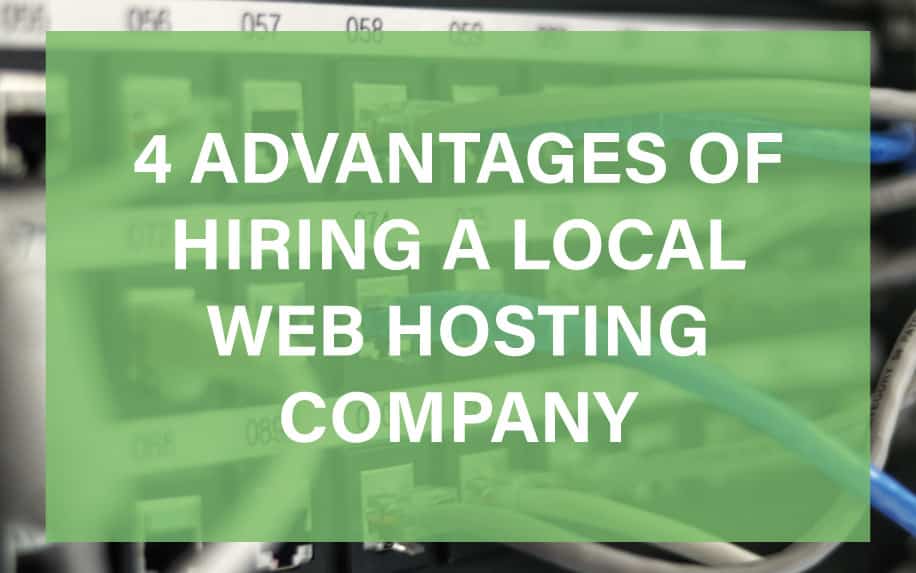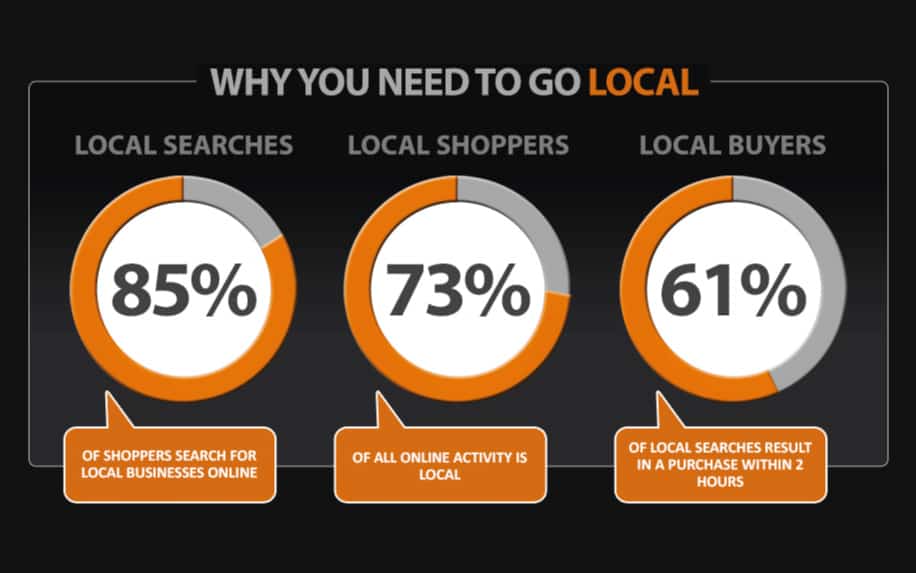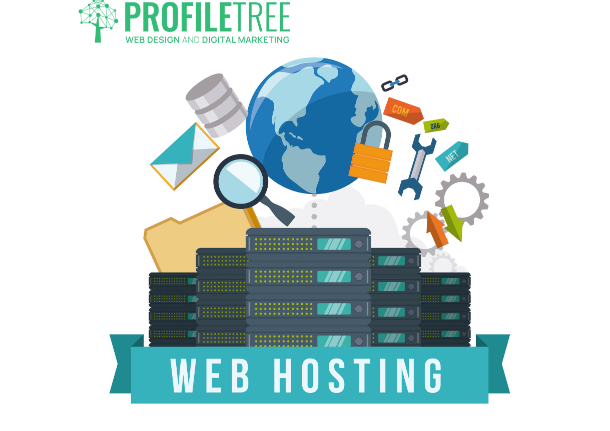Many small businesses purchase web hosting services from massive, faceless corporations. Local web hosting doesn’t even cross their minds. People assume that the biggest players can offer the best services for the lowest price.
But is this actually true?
The truth is that local hosting providers can offer concrete business benefits that the major players could only dream of. This includes savings in both time and costs, as well as clear boosts in your revenue.
Today, we’ll look at five of the major advantages of local hosting. But first, let’s go back to basics.
Table of Contents
What is Local Web Hosting?
Let’s break this down. Your web hosting is where the files which make up your site are stored. When someone visits your site, their browser finds these files on a server and interprets them to display your site.

This is a very simplistic explanation. For more details, check out our Beginner’s Guide to Web Hosting.
As the name suggests, A local hosting service is a company which provides this in your local area. But why would anyone care about where their website is physically hosted? Isn’t the whole point of the internet that geography doesn’t matter?
Let’s take a look at four tangible benefits of local hosting.
1. Customer Service and Hosting Support
With the best will in the world, sometimes things can go wrong with your hosting. Servers can go down for a number of reasons, and countless problems can arise with how files are transferred back and forth from your host to your users.
Local hosting companies will invariably offer a swifter and more personalised response.
Major companies may have millions of clients, so it’s impossible to have an in-depth knowledge of your particular needs. They may also have servers and customer service teams on different continents, which slows down their responses to your queries.
2. Technical and Local SEO
SEO and hosting go hand in hand. A huge part of this is load speed. This is where local hosting really shines. For obvious reasons, the closer a user is to your servers, the faster your website will load.
In fact, all else being equal, a local server will always be faster, and therefore more SEO friendly than an international equivalent.
Additionally, local hosting offers benefits for local search. A local search is any query where Google determines that the user is looking for something in their immediate area, whether this is stated in the search term or not.
The key here is the server’s IP address. This is a piece of data that denotes the location of a server. For local searches, Google will prioritise sites which are hosted on a server with a local IP address.
This is crucial when you consider the profitability of local SEO:

3. Pricing and Cost-Effectiveness
Of course, your choice of hosting provider is a major investment decision. Of course, this means that we can’t get away without talking about money. Often, the major international providers are able to offer lower upfront costs, largely due to economies of scale.
But the question is whether or not these are actually more cost effective.
Every shrewd business person knows that upfront costs aren’t everything. In reality, the return on any investment comes down to:
- Operational savings,
- Profit generation,
- The extent of hidden costs.
With regards to hosting, each of these can come into play in a number of ways. We’ve already touched on the first two to a certain extent. Specifically, this means:
Cost savings relating to eliminating the losses you’ll incur if your site is down for long periods,
Better local and technical SEO from local hosting companies will lead to more revenue generation, as you attract more traffic.
But what about hidden costs?
This is actually a huge issue when it comes to purchasing hosting from major companies. This is because web giants will be just fine with or without your business. This prevents them from going the extra mile.
Even moreso, it leads them to impose a number of financial catches on their clients. For example, almost all hosting packages will impose limits on you in terms of:
- Storage space,
- Transfer speeds,
- Bandwidth,
- Email.
The hidden costs come into play when you exceed these limits. Many large companies will impose heavy overuse fees. By contrast, this is less likely to happen with a local web hosting company, as they are more eager for your business.
They’re also typically more empathetic to your business needs, and will exercise greater flexibility.
4. Security, Data Protection and Compliance
Data protection is a more important issue than ever before. Today, most people have at least a basic awareness of the GDPR. However, there is a lot more to data protection than just following the EU’s rules.
In reality, different jurisdictions have their own rules and regulatory frameworks.
As such, from a compliance point of view, it makes much more sense to choose a local hosting provider, as they’ll have a better understanding of your particular regulatory situation. This will be especially important for Northern Ireland companies in coming years, if the UK data protection regime diverges from the GDPR post-Brexit.
This might seem counterintuitive, but local hosting companies are often more secure. This is because they are less of a target for hackers, so you’re less likely to suffer a breach. Since a local host handles less data, they’re also likely to notice and report breaches much faster when they do occur.

How to Gain the Advantages of Local Hosting
Many businesses are put off by the idea of changing hosting providers. They think it seems like an unnecessary hassle. However, in reality website migration has never been easier or more straightforward.
In fact, these days, migration can take place with no disruption to your online business at all.
The key thing is to speak to a local web hosting expert. That way, you’ll be confident that the best migration plan is put in place to meet your unique business goals. Speak to ProfileTree today to see how local hosting can benefit your business.
Considerations When Choosing a Local Web Hosting Company:
1. Reputation and Reviews:
- Look beyond their website: While every company presents itself positively, delve deeper. Check independent review platforms like Google My Business, Trustpilot, and industry forums.
- Read recent reviews: Pay attention to reviews posted within the past 6 months, as they reflect the most current experiences.
- Analyze common themes: Look for patterns in positive and negative reviews. What aspects are consistently praised or criticized?
- Ask specific questions: If you have particular concerns, reach out to reviewers directly through the platform for further insights.
2. Hosting Plans and Features:
- Understand your website’s needs: Analyze your website’s current traffic, content size, and potential growth.
- Compare storage space: Ensure the plan offers enough storage for your website’s files, databases, and email accounts.
- Evaluate bandwidth allocation: Analyze your website’s traffic patterns and choose a plan with sufficient bandwidth to handle peak usage without slowdowns.
- Prioritize security features: Compare security measures like firewalls, SSL certificates, and malware protection offered by different providers.
- Consider additional features: Explore features like website builders, email marketing tools, and backups offered by different plans.
3. Scalability and Growth:
- Check scalability options: Ask about options for upgrading your plan seamlessly as your website grows.
- Inquire about resource allocation: Ensure the provider offers dedicated resources or shared hosting with clear resource allocation practices.
- Understand data center limitations: Ask about the data center’s capacity and potential challenges for future expansion.
- Factor in migration costs: Consider potential costs associated with migrating to a different provider if your needs drastically outgrow the chosen plan.
4. Uptime and Reliability:
- Look for uptime guarantees: A reputable provider should offer an uptime guarantee of at least 99.5%, ideally closer to 99.9%.
- Check server performance metrics: Ask about server uptime history and monitor independent uptime tracking websites for real-time data.
- Inquire about backup solutions: Ensure the provider offers regular backups and robust disaster recovery plans in case of server outages.
- Understand maintenance procedures: Ask about scheduled maintenance periods and how they communicate planned downtime to clients.
5. Customer Support Options:
- Preferred communication channels: Choose a provider offering your preferred communication method, be it phone, live chat, email, or ticket system.
- Response time expectations: Clearly understand the provider’s average response time for support inquiries during business hours and emergencies.
- Technical expertise: Evaluate the support team’s technical knowledge and ability to address your specific questions and concerns.
- Local support availability: For complex issues, consider the benefit of having local support technicians readily available if needed.
Additional Considerations for Specific Needs:
1. E-commerce Websites:
- Payment Gateway Integration: Ensure the provider seamlessly integrates with your chosen payment gateway(s) for secure and efficient transactions.
- Shopping Cart Functionality: Look for hosting plans that offer built-in shopping cart features or compatibility with popular e-commerce platforms.
- Security Certifications: Choose a provider with PCI DSS (Payment Card Industry Data Security Standard) compliance and other relevant security certifications for secure customer data handling.
- Scalability for Peak Seasons: Anticipate increased traffic during holidays or sales and choose a plan with scalable resources to handle surges without performance issues.
- Content Delivery Network (CDN) Integration: Consider CDN integration for faster loading times and improved global reach for your online store.
2. High-Traffic Websites:
- Dedicated Hosting vs. Shared Hosting: Explore dedicated hosting options for guaranteed resources and optimal performance under high traffic loads.
- Load Balancing and Clustering: Inquire about load balancing and clustering technologies to distribute traffic efficiently across multiple servers.
- Content Delivery Network (CDN) Integration: Utilize a CDN to geographically distribute your website content and reduce latency for global visitors.
- Monitoring and Analytics Tools: Choose a provider that offers robust monitoring tools and analytics to track website performance and identify potential bottlenecks.
- Technical Support Availability: Ensure access to experienced technical support 24/7 to address any performance issues promptly.
3. SEO-Focused Websites:
- Server Location: If targeting a specific local audience, consider the server location’s impact on local search engine ranking.
- IP Reputation: Choose a provider with a clean IP reputation to avoid potential search engine penalties.
- Content Delivery Network (CDN) Integration: Utilize a CDN to improve website speed and accessibility, which are crucial ranking factors.
- SEO-Friendly Hosting Features: Look for features like website builder tools optimized for SEO and easy meta tag management.
- Analytics and Reporting: Choose a provider offering detailed analytics and reporting tools to track SEO performance and website traffic.
Case Studies: Local Web Hosting Success Stories
1. Thriving Local Bakery Boosts Online Sales with Reliable Hosting:
Company: Sweet Treats by Sarah, a local bakery in Seattle, Washington.
Challenge: Sarah’s bakery website experienced frequent downtime and slow loading times, hindering online orders and customer satisfaction.
Solution: Partnered with a local web hosting company known for its reliable infrastructure and uptime guarantees.
Results: Significant increase in online orders and website traffic due to improved performance and user experience. Sarah also received personalized support from the local provider, helping her optimize her website for better search engine ranking.
Testimonial: “Since switching to local hosting, my website has been running smoothly, and my online orders have skyrocketed! The local support team has been amazing, helping me with everything from website maintenance to SEO tips.” – Sarah, Owner of Sweet Treats by Sarah.
2. Local Restaurant Chain Enhances Online Presence with Scalable Hosting:
Company: The Burger Barn, a growing restaurant chain with multiple locations in California.
Challenge: The Burger Barn’s website struggled to handle increasing online traffic during peak hours, impacting online reservations and brand reputation.
Solution: Collaborated with a local web hosting company offering scalable hosting solutions and expertise in high-traffic websites.
Results: The Burger Barn’s website now seamlessly handles surges in traffic, ensuring smooth online reservations and a positive customer experience. They also benefit from the provider’s local SEO expertise, improving their online visibility.
Testimonial: “Our partnership with our local web hosting provider has been instrumental in our online growth. They’ve provided us with the reliable and scalable infrastructure we need to handle our growing customer base and helped us attract more local customers through SEO.” – John, Marketing Manager of The Burger Barn.
3. E-commerce Startup Achieves Global Reach with Secure Hosting:
Company: Eco-Friendly Finds, an online store selling sustainable products worldwide.
Challenge: Eco-Friendly Finds needed a secure and reliable hosting solution to protect customer data and ensure smooth international transactions.
Solution: Partnered with a local web hosting company specializing in e-commerce hosting and offering global server locations.
Results: Eco-Friendly Finds now benefits from secure payment gateways, PCI compliance, and a geographically distributed server network for faster loading times worldwide. This has led to increased sales and customer satisfaction across different regions.
Testimonial: “Choosing a local provider with global expertise has been a game-changer for our business. They’ve provided us with the secure and reliable hosting infrastructure we need to reach customers worldwide and offer a seamless shopping experience.” – Maria, Founder of Eco-Friendly Finds.
FAQs: Local Web Hosting Company Concerns
1. Why choose a local web hosting company over a larger national provider?
- Personalized support: Local providers often offer more personalized and readily available support, ensuring quicker response times and tailored solutions.
- Community and trust: Supporting local businesses fosters a sense of community and helps ensure accountability within your local economy.
- Understanding local needs: Local providers typically have a deeper understanding of regional internet infrastructure and user behavior, catering to specific needs better.
- Potential cost benefits: In some cases, local providers may offer competitive pricing or avoid international transfer charges, leading to cost savings.
2. How do I know if a local web hosting company is reputable and reliable?
- Check reviews and ratings: Look for independent reviews on platforms like Google My Business, Trustpilot, and industry forums.
- Verify accreditation and certifications: Ensure they hold relevant industry certifications and maintain compliance with data security standards.
- Ask about uptime guarantees and service level agreements (SLAs): Understand their commitment to performance and customer satisfaction.
- Inquire about their server infrastructure and disaster recovery plans: Ensure they have robust systems to prevent downtime and data loss.
3. What features and services should I look for in a local web hosting plan?
- Storage space and bandwidth: Choose a plan that accommodates your website’s current and potential future needs.
- Security features: Look for essential features like firewalls, SSL certificates, and malware protection.
- Scalability options: If you anticipate growth, ensure the plan allows for easy upgrades without service disruptions.
- Backup and recovery solutions: Regular backups and robust disaster recovery plans are crucial for data protection.
- Customer support options: Choose a provider offering preferred communication channels and responsive support during business hours and emergencies.
4. Are there specific considerations for different types of websites, like e-commerce or high-traffic sites?
- E-commerce: Look for features like payment gateway integration, shopping cart functionality, and PCI compliance.
- High-traffic websites: Consider dedicated hosting, load balancing, and Content Delivery Networks (CDNs) for optimal performance.
- SEO-focused websites: Local server location, CDN integration, and SEO-friendly features can contribute to better search engine rankings.
5. What is the typical cost of local web hosting services?
Costs vary depending on your specific needs, features required, and chosen plan. Compare different providers and prioritize value over cheap prices. Remember, reliable performance and excellent support are crucial investments for your website’s success.
Conclusion: Partnering with the Right Local Web Hosting Company for Success
Choosing the right local web hosting company is a crucial decision that can significantly impact your website’s performance, security, and ultimately, your online success. By considering your specific needs, weighing the advantages of local providers, and carefully evaluating their services based on the points discussed in this article, you can make an informed and confident choice.
Remember, local web hosting offers more than just proximity; it fosters personalized support, community connection, and often caters to regional needs better. By partnering with a reliable and reputable local provider, you gain access to expert guidance, efficient solutions, and the peace of mind knowing your website is in good hands.
Take the initiative today! Research local providers, explore their plans and features, and don’t hesitate to ask questions. The right local web hosting company can be a valuable asset in your online journey, helping you achieve your website’s full potential and reach your target audience effectively.


